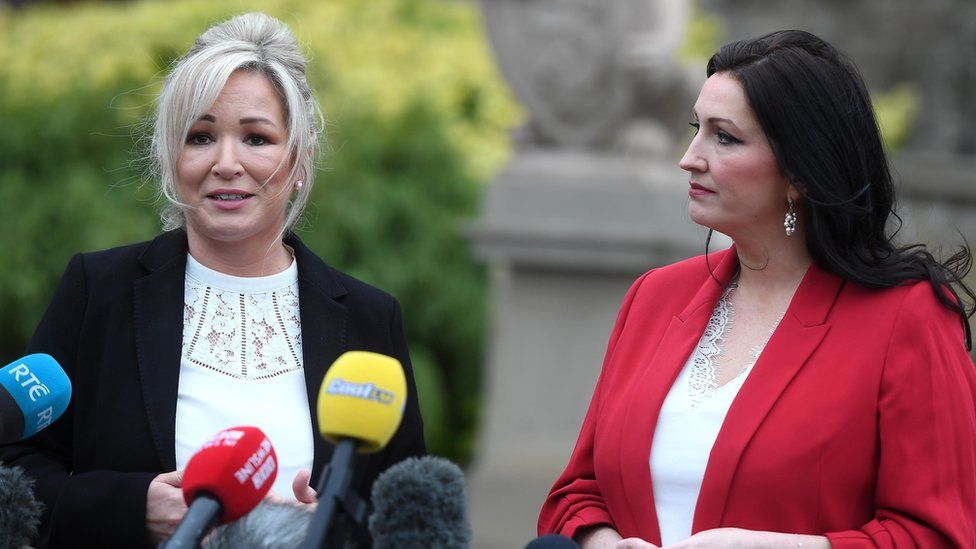
Michelle O’Neill and Emma Little-Pengelly lead Northern Ireland’s governing Executive
By Jayne McCormack
BBC News NI political correspondent
Public finances and childcare provision in Northern Ireland are on the agenda as Stormont ministers meet on Thursday.
It is the first substantive meeting of the Executive since power-sharing returned after a 24-month hiatus.
The focus on finances comes amid a dispute between the UK government and Stormont over a £3.3bn financial package for restoring devolution.
The UK government has asked ministers to raise a minimum of £113m.
However, Northern Ireland parties want more funding from the UK Treasury and insist they did not commit to revenue raising as part of the deal agreed with the government.
On Thursday, ministers will get an update from Finance Minister Caoimhe Archibald about the current budgetary position.
It is understood that talks will be held between Ms Archibald’s department and Treasury officials in the coming days.
These are understood to be part of negotiations about Stormont’s finances for 2024-25 and the conditions the government is asking the Executive to adhere to.
Ministers are expected to get an update from Caoimhe Archibald about the current budgetary position
Negotiations between different Stormont departments and trade unions over long-running pay deals is also likely to feature during Thursday’s meeting.
Education Minister Paul Givan had already said he will update the Executive about plans to improve childcare provision in Northern Ireland.
‘Left behind’
Earlier this week, he said up to £400m could be needed to develop and implement a new early learning and childcare strategy.
There is no scheme currently in place for free childcare in Northern Ireland, with some parents in Northern Ireland saying they are being left behind as other parts of the UK benefit from childcare support measures.
Image source, Getty Images
There is no scheme currently in place for free childcare in Northern Ireland
On Wednesday, First Minister Michelle O’Neill said if the Executive was to do “one thing well” in the short-term, it should be delivering on childcare and making it a key priority.
She also ruled out a 15% increase in the regional rate as a means of raising revenue, a figure which according to previous government estimations could raise £113m.
Rates are a property tax which help fund public services in Northern Ireland.
Stormont is responsible for setting the domestic regional rate and while Ms O’Neill ruled out any dramatic rise, an inflation-only increase would still mean adding at least 4% to bills for the next financial year.
Later on Thursday, the Northern Ireland Fiscal Council will publish a report on the UK government’s support package for the restored Stormont Executive.
Its chair, Sir Robert Chote, said the Executive had a choice between implementing revenue raising measures or hoping the government will have “a change of heart”.
“There is some extra money coming in through this package, some useful additional support in the longer term,” he told BBC News NI’s Good Morning Ulster.
“But be in no doubt that the Executive is going to confront some difficult choices and challenges, not just about the possibility of raising revenue but about reform of public services.”
‘Expectation’ for revenue raising measures
The Social Democratic and Labour Party’s Matthew O’Toole, who is leader of the opposition, said from initial discussions with the UK government in December there was a “fairly clear expectation” that revenue raising was an expectation.
“I do think it’s a bit disingenuous now to make out that was sort of not there or in the ether,” he said.
Deputy First Minister Emma Little-Pengelly, of the Democratic Unionist Party (DUP), said it was the “wrong time” to be proposing revenue-raising.
“We’ll be making the case very strongly that hard-pressed families in Northern Ireland are under enough financial pressure at the moment,” she said.
“This is the wrong time for this sort of proposal.”
Their comments came as the top civil servant in Stormont’s Department of Finance, Neil Gibson, said officials have not yet been asked to begin work on revenue raising.








